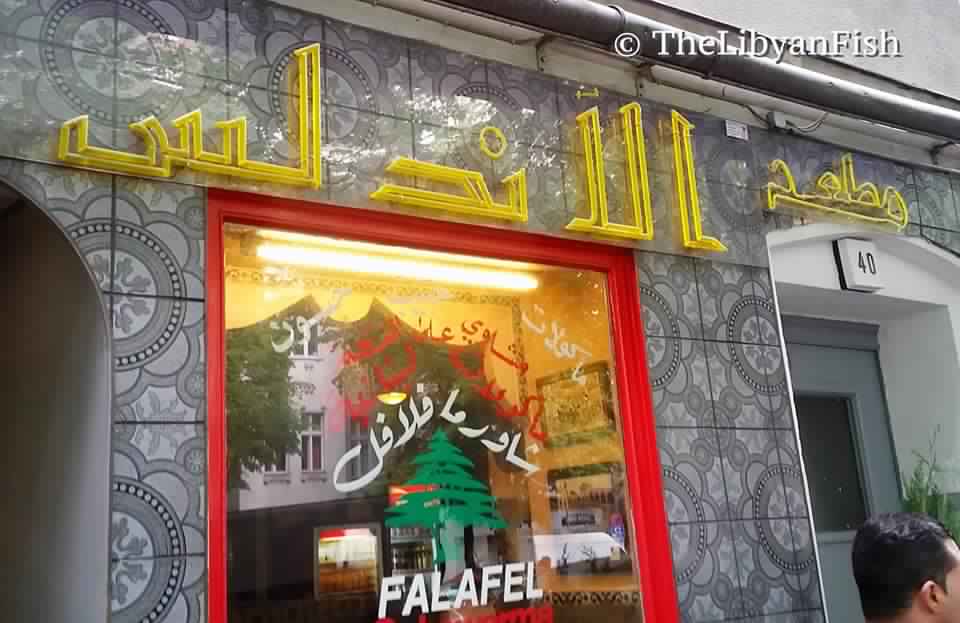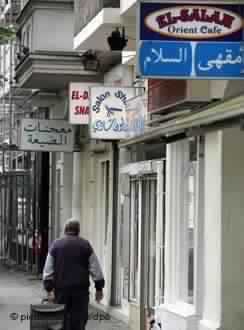Reporting by Fouad Abdulaziz; Translation by Yusra Ahmed
(Eqtsad- Zaman Al Wasl)- “Arab Street” in the centre of Berlin, Germany, is situated in one of the poorest areas of the city called Sonnenallee.
Once you enter the street, you feel like you have traveled tens of thousands of kilometre to land in a popular neighbourhood in Damascus or any Syrian citym as you hear the familiar accent of Levant region like Syria, Palestine and Lebanon.
The Street first was dominated by Palestinians and Lebanese, because of that it was nicknamed as “Little Beirut, or Gaza Strip.
My friend told me that the majority of Lebanese were supportive to Hezbollah because of that they showed hate to Syrians who express their support to the revolution.
The presence of Syrians in the street was not that prominent in the beginning, but after the revolution and the refugees surge to Germany, they began to have their finger prints in the street, especially because of their polite way of dealing with customers, and the obvious cleanness and tidiness in their shops.

“People here resemble Syrians to magnet and they attract customers quite strongly”, the speaker explained proudly.
Sonnenallee is rich of the Eastern and Arabic atmosphere and shows seamless harmony within the Arabic community, the second largest Berlin minority, after the Turks.
When looking around in the street, you see the chaos seen in the Arabic cities’ neighbourhoods, where reckless youth speak and shout in their Arabic language with different accents, which remind you with careless young men in their home country.
In our walk in the street, we stopped at different shops and tasted different Arabic food, sweets and pastries.
The notable point was that all shops names were written in Arabic Language, which gave an impression of the openness and welcoming policy of Germany.

In the evening, we spent some time in a Syrian café and cultural forum, its owner is a Syrian who ran away from Syria a year and a half, and decided to establish the forum, to facilitate communication among writers, poets and musicians where they meet in the café, beside that people can play cards, smoke nargilas and of course they can sit and have drinks at cheap prices.
There was a singer from Aleppo In the café, who had a very beautify voice and sang many of Aleppo’s traditional songs, which made me fly back home in Damascus and incited my memories of its air and smell, which I used to enjoy three years ago, but now I do not know when I will be back. That caused deep pain to me, but luckily, my friend woke me up to leave the place before it got too late.
Number of Syrians in Germany in 2015 reach to 360 thousands, two thirds of them, almost 243 thousands, sought asylum in 2015.
(Eqtsad- Zaman Al Wasl)- “Arab Street” in the centre of Berlin, Germany, is situated in one of the poorest areas of the city called Sonnenallee.
Once you enter the street, you feel like you have traveled tens of thousands of kilometre to land in a popular neighbourhood in Damascus or any Syrian citym as you hear the familiar accent of Levant region like Syria, Palestine and Lebanon.
The Street first was dominated by Palestinians and Lebanese, because of that it was nicknamed as “Little Beirut, or Gaza Strip.
My friend told me that the majority of Lebanese were supportive to Hezbollah because of that they showed hate to Syrians who express their support to the revolution.
The presence of Syrians in the street was not that prominent in the beginning, but after the revolution and the refugees surge to Germany, they began to have their finger prints in the street, especially because of their polite way of dealing with customers, and the obvious cleanness and tidiness in their shops.

“People here resemble Syrians to magnet and they attract customers quite strongly”, the speaker explained proudly.
Sonnenallee is rich of the Eastern and Arabic atmosphere and shows seamless harmony within the Arabic community, the second largest Berlin minority, after the Turks.
When looking around in the street, you see the chaos seen in the Arabic cities’ neighbourhoods, where reckless youth speak and shout in their Arabic language with different accents, which remind you with careless young men in their home country.
In our walk in the street, we stopped at different shops and tasted different Arabic food, sweets and pastries.
The notable point was that all shops names were written in Arabic Language, which gave an impression of the openness and welcoming policy of Germany.

In the evening, we spent some time in a Syrian café and cultural forum, its owner is a Syrian who ran away from Syria a year and a half, and decided to establish the forum, to facilitate communication among writers, poets and musicians where they meet in the café, beside that people can play cards, smoke nargilas and of course they can sit and have drinks at cheap prices.
There was a singer from Aleppo In the café, who had a very beautify voice and sang many of Aleppo’s traditional songs, which made me fly back home in Damascus and incited my memories of its air and smell, which I used to enjoy three years ago, but now I do not know when I will be back. That caused deep pain to me, but luckily, my friend woke me up to leave the place before it got too late.
Number of Syrians in Germany in 2015 reach to 360 thousands, two thirds of them, almost 243 thousands, sought asylum in 2015.
















Comments About This Article
Please fill the fields below.